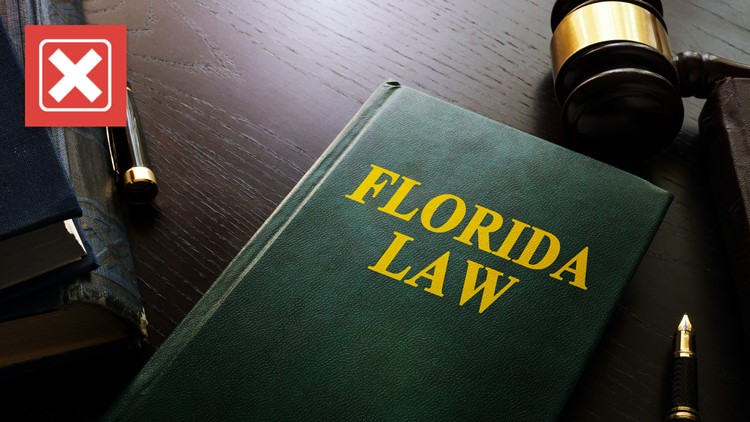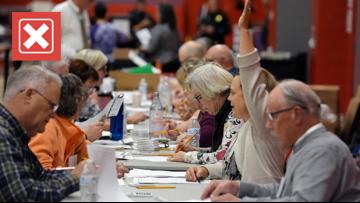On March 28, Florida Gov. Ron DeSantis signed the Parental Rights in Education bill into law. The bill prohibits classroom discussion about sexual orientation or gender identity in kindergarten through third grade “or in a manner that is not age-appropriate or developmentally appropriate for students in accordance with state standards.” It also gives parents an option to sue a school district if the policy is violated. The bill is set to go into effect on July 1.
Since the bill was first introduced in January, several critics, including the Florida Education Association and Florida’s first openly LGBTQ Latino lawmaker Rep. Carlos Guillermo Smith, have called the measure the “Don’t Say Gay” law, suggesting it aims to limit LGBTQ discussion in schools. President Joe Biden, U.S Secretary of Education Miguel Cardona, multiple LGBTQ rights groups, and the Walt Disney Company have also spoken out against the bill.
VERIFY viewers Charles and Jesco recently sent us messages asking whether the phrase “don’t say gay” is actually included in the text of the legislation.
THE QUESTION
Does Florida’s Parental Rights in Education law say “don’t say gay” in its text?
THE SOURCES
- Parental Rights in Education (House Bill 1557)
- Florida Gov. Ron DeSantis (R)
- Florida state Rep. Joe Harding (R)
- Florida state Rep. Carlos G. Smith (D)
- Lawsuit filed by Kaplan Hecker & Fink LLP and the National Center for Lesbian Rights
- National Education Association (NEA)
THE ANSWER
No, Florida’s Parental Rights in Education law does not say “don’t say gay” in its text.
WHAT WE FOUND
The phrase “don’t say gay” is not included in the official text of the Parental Rights in Education bill. In fact, the law does not mention the words lesbian, gay, bisexual, transgender or queer at all. Nor does it include the LGBTQ acronym. It does, however, contain the terms “sexual orientation” and “gender identity.”
Instead, the law states “Classroom instruction by school personnel or third parties on sexual orientation or gender identity may not occur in kindergarten through grade 3 or in a manner that is not age appropriate or developmentally appropriate for students in accordance with state standards.”
The law does not directly define what constitutes discussion of “sexual orientation or gender identity.” It also does not define what "a manner that is not age appropriate or developmentally appropriate for students” means.
Republican state Rep. Joe Harding, the bill’s sponsor, has said the law would not bar spontaneous discussions about sexual orientation or gender identity in schools but it would prevent districts from integrating the subjects into official curriculum.
Harding also sought to require schools to inform parents if a student came out as LGBTQ to a teacher during the bill’s early stages, however, he withdrew the amendment in February after facing backlash online.
“Nothing in the amendment was about outing a student. Rather than battle misinformation related to the amendment, I decided to focus on the primary bill that empowers parents to be engaged in their children’s lives,” Harding said in a statement.
Meanwhile, critics of the bill, including the National Education Association (NEA), have said the law’s language, including the phrases “classroom instruction” and “age appropriate,” could be interpreted so broadly that any discussion could trigger lawsuits and create a classroom atmosphere where teachers would avoid the subjects entirely.
“The bill’s intentionally vague language leaves teachers afraid to talk to their students and opens up school districts to costly and frivolous litigation from those seeking to exclude LGBTQ people from any grade level,” Florida state Rep. Carlos G. Smith, a Democrat who is gay, said in a statement. “Even worse, #DontSayGay sends a hateful message to our most vulnerable youth who simply need our support.”
The NEA also says the law's vague language opens the door for restrictions that may prohibit educators from teaching books that recognize the mere existence of same-sex couples or reference an individual's gender in any way.
Another risk the law poses, according to the NEA, is that LGBTQ educators may be forced to disguise their identity to their students and LGBTQ students or students with same-sex parents may be prohibited from equal participation in classroom discussions about their views or their families.
“If the law were applied to prohibit LGBTQ educators — and only LGBTQ educators — to disguise their identity in the presence of students, this discriminatory difference in working conditions may violate Title VII, almost certainly causes harm on the basis of sex discrimination in violation of Title IX, and amounts to intentional discrimination in violation of the Equal Protection Clause under the Supreme Court’s recent decision in Bostock v. Clayton County," the NEA wrote.
“Similarly, if the law were applied to prohibit LGBTQ students from equally participating in class discussions about their views, or to prohibit students with same-sex parents from equally participating in class discussions about their families, the law would almost certainly cause harm in violation of Title IX’s prohibition against discrimination on the basis of sex,” the NEA continued.
Gov. Ron DeSantis, and other Republican lawmakers, have repeatedly defended the law, saying that parents, not teachers, should be broaching subjects of sexual orientation and gender identity with their children.
“We will make sure that parents can send their kids to school to get an education, not an indoctrination,” DeSantis said before signing the bill into law at a ceremony at a preparatory school outside Tampa on March 28.
On March 31, a lawsuit was filed in federal court against DeSantis and the Florida State Board of Education on behalf of LGBTQ rights groups, including Equality Florida, Family Equality and the National Center for Lesbian Rights. It alleges that the law violates the constitutionally protected rights of free speech, equal protection and due process of students and families.
“This effort to control young minds through state censorship — and to demean LGBTQ lives by denying their reality — is a grave abuse of power,” the lawsuit said.
DeSantis, however, has said numerous times that he’s not backing down to the criticism.
“It doesn't matter what critics say,” DeSantis said. “We're going to make sure that parents are able to send their kid to kindergarten without having some of this stuff injected into their school curriculum.”
The Associated Press contributed to this report













